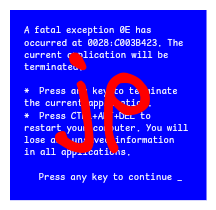I guess assembler is sumerien then, only still written and understood? And cobol or fortran? Linear a and b?
Assembly is ancient Egyptian heiroglyphs.
FORTRAN: Proto-Indo-European COBOL: Proto-Sino-Tibetic
Assembly: neuron signals
What about basic and assembly? Even Pascal?
Yeah I’ve not done any coding in a while.
Literally all of these languages are rooted in English.
C: printf()
C++: cout
JavaScript: document.write() or window.print()
Java: system.out.println()
Python: print()
Rust: print()
Exactly zero of those reference a language other than English. I’m not even a linguist and this is just silly. It’s literally part of why English is becoming the dominant world language, because if you learn computer programming you basically have to learn English.
Whoosh!
Have an sympathy upvote.
Humor comes fast to you, but you’re obviously faster.
I mean, that’s fair. I get it, I just don’t really find it very funny.
From your comment, I’m not convinced you do get it. You wrote a lot of words completely beside the point of the joke, which is a series of analogies, not a statement about the natural languages involved in the creation of programming languages.
Yet somehow the top comment is basically saying what I’m saying. Interesting.
It’s not the same to continue with the joke and to completely miss the point and complain about it.
The first is funny, the second is sad. I believe I had to clarify that for you
This comment? https://fedia.io/m/[email protected]/t/1239473/-/comment/7462582
I honestly do not understand what similarity you see between “this post seems like it will make linguists angry” and “the languages in this joke actually use English keywords and standard library names.” The post isn’t even about keywords and names.
Damn!
This is the programming humor community. Emphasis on the humor part.
Perl is… forgotten entirely, despite its efforts in getting us from there to here.
Yup, checks out.
PHP also, but good riddance:-D.
Shell scripting is the ink that makes up these words - without them, you would never have seen this image.
I think Perl is closer to Esperanto - the vast majority of people will never want to learn it and the people that know it won’t stfu about how everyone should use it! And they could all use a shower!
(I kid… Mostly)
No, that’s perfect
Plus it has markers for variable types just like Esperanto has suffixes for parts of speech. Wall was a linguist, after all.
As a Perl user who won’t shut up about it… Yeah. Yeah, that’s pretty fair.
You… you shut up! Excuse me, I have to go take a shower:-) (/s, edit: to be clear on both sentences here)
Anyway you’re right (no /s) - at one point it filled in a gap between the likes of C++ and Assembly on the one hand and shell scripting (bash, awk, grep, sed, each with its own syntax and very little of that shared in common with one another) and I guess Fortran on the other. I still prefer it enormously to everything else - it’s quirky but fun:-) - though I get why a less experienced person should choose Python and stick with it, even as we all wish that there was another alternative that would work better than either.
And since I can’t resist: Perl is 8-20x faster than Python, and major websites like DuckDuckGo and booking.com use it. Sigh…I guess it’s time for that shower now:-).
I write several flavours of BASIC fluently, Fortran and Pascal passably, three forms of assembler well enough to get by, and I’ve worked in COBOL.
Ackshully, Clojure is Esperanto, and I will not be taking questions at this time.
I miss writing in clojure. I never have a reason to write in a functional language at work
RustyRooster: C is the root of all modern languages
FORTRAN: Am I a joke to you?
Fortran is Proto-Indo-Germanic or whatever it’s called again
Lisp (specifically IPL) is Proto-Indo-European. All languages have unwittingly taken inspiration from it
LISP is too old to care any more.
No grandpa fortran, everybody loves you. Now let’s get you back inside with cobol.
thanks, i hate it
This is great.
If I could make one change, there’s so many funnier languages that could have been Esperanto. I would have taken a shameless jab at F#, myself.
It’s a cool meme but I have many many disagreements.
basic is like toki pona then i guess, like python but even easeier
no wait, that ones gray snail (minimalist vocabulary: it has only 4 commands)
APL is Ithkuil.
I suspect there’s more people who speak Python fluently than Esperanto. So that comparison sits very wrong with me. The rest was funny :)
It’s probably a similar learning speed
Esperanto always struck me as more perl-like with each part of speech having its own suffix like perl has $ for scalars, @ for arrays, and % for hashes. Though perl is probably more like a bunch of pidgins…
Yeah, I was about to say.
Perl 5 is like Esperanto: borrowed neat features from many languages, somehow kinda vaguely making a bit of sense. Enjoyed some popularity back in the day but is kind of niche nowadays.
PHP is like Volapük: same deal, but without the linguistic competence and failing miserably at being consistent.
Raku (Perl 6) is like Esperanto reformation efforts: Noble and interesting scholarly pursuits, with dozens of fans around the multiverse.
Esperanto’s equivalent would probably be Haskell.
Python is probably more like Spanish. Very easy basics, but then people from different regions of where it’s has spread out barely understand each other
Nobody mentioned number of speakers though
No, but the adoption rate is likely related to how useful the language is?
Python malfeliĉas min.
Kia domaĝo. La unua programlingvo kiun mi lernis estis Python. Ĝi multe helpis min kompreni programadon kaj lerni aliajn programlingvojn. Simile estas kun Esperanto. Ĝi helpis min lerni la francan kaj faciligis la lernadon de alia gramatikaĵo.
Ho, kaj mi ankoraŭ povas paroli Esperanton.
Mi pensas ke, vi volis tajpi, “Python (aŭ Pitono) malfeliĉigas min.”
- Mal : Opposite
- Feliĉ- : Happy
- Ig : Makes (Transitive verb)
- As : Present tense.
“Mi malfeliĉas.” : I’m sad.
“Pitono malfeliĉigas ĉiujn.” (Python makes everyone sad.)
PHP is Russian. Used to be huge, caused lots of problems, now slowly dwindling away. Its supporters keep saying how it’s still better than the competition.
True, but only because it actually is. Except weirdos who saw php code 20 years ago say it sucks.
Why is everyone down on Rust? Seriously. I don’t know it but I’ve considered learning it and it appeals to me and people literally scoff when I mention it. Saw it referred to as a meme language on Lemmy, which is built in Rust. What am I missing?
Butthurt C devs don’t want it replacing their language.
as guy who likes c: think rust is a good and cool idea
For me “The Critical Flaw” of rust is its compiler. And requirent of 12 GB of disk space to compile just the frontend of compiler. Even GCC will all frontends(C, C++, Ada, Fortran, Modula-2, JIT) requires less space.
But joke is probably about “rewrite in rust” culture.
Maybe someone ought to rewrite rust in C.
that’s because Rust is more modern and in modern days we don’t rly have hard disk limitation, also it’s probably because the compiler tells you the solution to most problems
and in modern days we don’t rly have hard disk limitation
well if you are a corporation, that’s true. Otherwise, not much
I mean c’mon, every pc that can compile rust in a reasonable time has at least 20gb of storage
yeah but I don’t want to use up 20 GB just for a single project. It’s not like my hard drive is 80% free. more like 10% free, even though it’s large, because I’m using it and I’m already selective on what I’m doing on it
Wow that’s enormous. I’ll have to learn more about that. Thanks for the info!
It’s like a good C++ that is actually able to replace it. There are lots of places where a good C++ is useful. Like everything that needs low latency and low resource usage.
But it’s not an easy language, so (I’m guessing) people who see everyone loving it but are unable to learn it start to suffer some sort of cognitive dissonance. If it’s too difficult for me to learn, that must be its fault, not mine.
I think rust has good ideas and may even become the default systems language in the mid-term. I find it irritating that there is a very vocal subset of rust proponents that tend to insist that every project in every language needs to be rewritten in rust immediately. I suspect that is also why other people are down on rust.
That makes sense! Thanks for your insight
I don’t think many ppl are down on rust… it’s won developer’s most favorite to use for like 5+ years now in a row on stackoverflow.
Cause it’s a C++ replacement when said audience never asked for one. It’s great but it’s still waaaayy too early, people need to slowly get comfortable with it.
Imo it’s bc it’s the new kid on the block. Yes it’s 10 years old but barely becoming common use in production and government mandates are only speeding that up. In actuality it’s a great language and has been hyped for a few years by people who actually use it. Python went through the same thing in the 2010s where devs really tried clowning on it, now it’s used everywhere.
Good to know, I’ve only been a dev since 2019 so I appreciate the long view
i think it’s mainly people being cranky and set in their ways. they got used to working around all the footguns/bad design decisions of the C/C++ specifications and really don’t want to feel like it was all for nothing. they’re comfortable with C/C++, and rust is new and uncomfortable. i think for some people, being a C/C++ developer is also a big part of their identity, and it might be uncomfortable to let that go.
i also think there’s a historical precedent for this kind of thing: when a new way of doing things emerges, many of the people who grew up doing it the old way get upset about it and refuse to accept that the new way might be an improvement.
Is Rust as close to the metal as C? Seems like there would still be a need for C. I could see Rust replacing Java as something that’s so ceremonial and verbose, but from my limited perspective as a sometimes java dev, having only the most glancing experience with C, it seems like C would be hard to replace because of what it is. Buy I honestly don’t know much about Rust either, I just think JS is so finicky and unpredictable whereas web assembly seems extremely fast and stable.
Rust can create native binaries but I wouldn’t call it close to the metal like C. It’s certainly possible to bootstrap from assembly to Rust but, unlike C, every operation doesn’t have a direct analog to an assembly operation. For example Rust needs to be able to dynamically allocate memory for all of its syntax to be intact.
For example Rust needs to be able to dynamically allocate memory for all of its syntax to be intact.
Hmm, you got an example of what you mean?
Rust can be used without allocations, as is for example commonly done with embedded.
That does mean, you can’t use dynamically sized types, likeString,VecandPathBuf, but I wouldn’t consider those part of the syntax, they’re rather in the std lib…So you’re right that this is a bit arbitrary because the line between the standard lib and the language is blurry, but someone writing Rust is going to expect Vec to work, it doesn’t even require an extra “use” to get it.
Perhaps a better core example would be operator overloading (or really any place using traits). When looking at “a + b” in Rust you have to be aware that, depending on the types involved, that could mean anything.
Anyway, I love Rust, it just doesn’t have the 1:1 relationship with the assembly output that C basically still has.
Thank you for the explanation.
I mean, the simple proof is that Rust has been growing by leaps and bounds in the embedded world, which is the closest to bare metal you get. It’s also being used in the Linux kernel and Windows, and there are several projects building new kernels in pure Rust. So yeah, it’s safe to say that it’s as close to the metal as C.
Also, the comparison to Java is understandable if you’ve only been exposed to Rust by the memes, but it doesn’t hold up in practice. Rust has a lot more syntax than C (although that’s not saying much), but it’s one of the most expressive languages on the market today.
It’s slightly less close to the metal as C. Array bounds checks are always going to cost you something, for example. However, if you look at the speed of numeric computation in C, Rust, and Go, they’re all in the same order of magnitude performance compared to things like Python or JavaScript (not including things like PyPi, which is C with extra steps).
Wow thanks so much for breaking that down for me! The discussions I’ve been having here and the information devs are sharing is really kicking me off the fence about learning Rust
Eh, I’d still go for it. I find the Rust compiler tends to amplify my impostor syndrome–it tells you all the ways you are objectively being stupid. I know that’s not really selling it, but it’s doing that stuff for a reason. I’m especially hopeful that it becomes the standard way to do things with microcontrollers; that’s about the only place I write C/C++ at all.
Noted!
Some rust proponents having this attitude is probably part of the problem.
I think ppl just got pissed with the fanboys unironically asking to RIIR everything. The language itself is comfy AF, tho





















